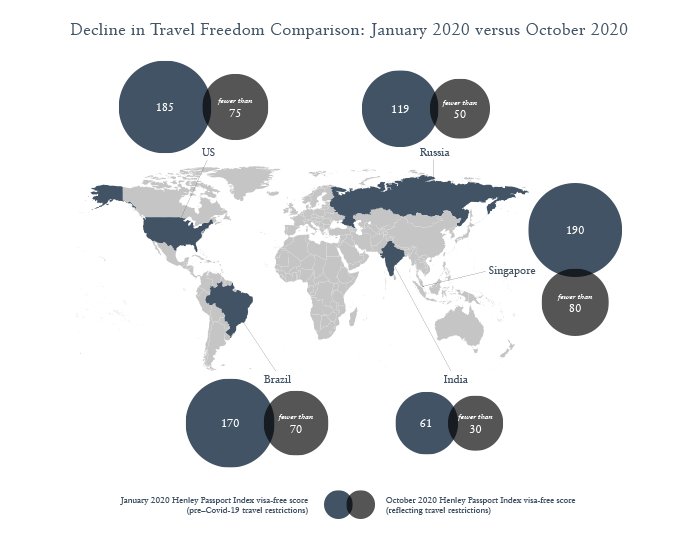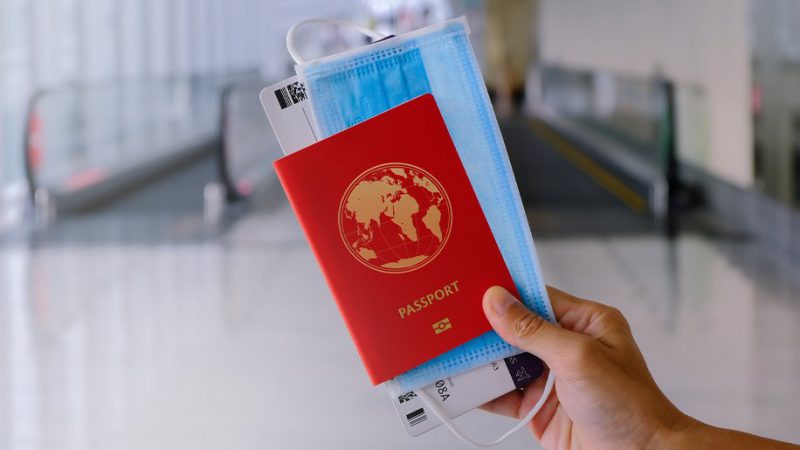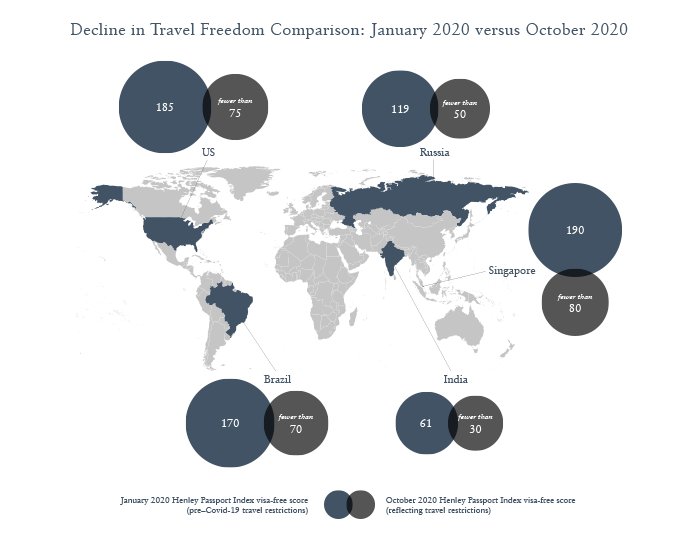Declining Passport Power Reveals COVID-19 Upheaval
Research shows constraints in global mobility as international travel resumes
October 14, 2020

As some countries begin to lift coronavirus-related travel restrictions, one outcome of the pandemic that has emerged is the shakeup in global mobility, according to the latest research from Henley & Partners, a global provider in residence and citizenship planning services.
The Henley Passport Index ranks all the world’s passports according to the number of destinations their holders can access without a prior visa.
At the beginning of the year, the index ranked US passports in 6th place meaning Americans could travel hassle-free to 185 destinations around the world. Since then, that number has dropped dramatically, with US passport holders currently able to access fewer than 75 destinations, with the most popular tourist and business centers notably excluded.
Other significant changes wrought by the chaos of the Covid-19 pandemic include the Singapore, which at the beginning of 2020 was ranked 2nd globally; Singapore passport holders were able to access 190 destinations globally. However, under the current travel restrictions, Singaporeans can travel to fewer than 80 destinations around the world.
Other countries’ passport power has dropped in relation to how well COVID-19 measures have contained the spread of the virus. Brazilian passport holders were able to access 170 destinations without acquiring a visa in advance in January. Currently, approximately only 70 destinations are accessible.
Russian citizens had access to 119 destinations prior to the COVID-19 outbreak but can currently travel to fewer than 50. At the beginning of the year, Indian passport holders could travel to 61 destinations without a visa but due to virus-related restrictions, they currently have access to fewer than 30.
Because of the volatile nature of pandemic-related quarantines, bans and restrictions, the just-released Henley Passport Index – which is based on data from the International Air Transport Association – cannot factor in the various stumbling blocks to global travel.
The current index puts Japan in the number one spot on with a visa-free/visa-on-arrival score of 191. Singapore remains in 2nd place, with a score of 190, while Germany and South Korea are tied 3rd, each with a score of 189. EU member states continue to perform best overall, with countries from the bloc taking up most of the spots in the index’s top 10.
“For citizens of wealthy and democratic countries such as Canada, the UK, the US, and Western European nations, travel freedom is something that has been taken for granted for decades. The pandemic has abruptly changed this,” noted Dr. Christian H. Kaelin, chairman of Henley & Partners and the inventor of the passport index concept. “There’s been a shift away from travel freedom being regarded as the prerogative of nationals with once-powerful passports, towards a realization that it is now a necessary luxury for those wishing to access first-class education, business opportunities, and quality healthcare for themselves and their families.”
Greg Lindsay, Director of Applied Research at NewCities, points to the rise of so-called “digital nomads” as another sign of adaptation to crisis and uncertainty, particularly regarding the results of the upcoming US election. “After the pandemic hit, overnight the world’s knowledge workers became temporary professional nomads, and the disparity between national responses threw into stark relief the comparative advantages of alternative citizenship – especially for Americans suddenly locked out of much of the world.”
The result has been an unprecedented interest in residence- and citizenship-by-investment programs from citizens of developed economies, particularly the US, said Dr. Juerg Steffen, CEO of Henley & Partners. “In fact, there was a startling 238 percent increase in enquiries from Americans between January and mid-September 2020 compared to the same period in 2019.”
The pandemic and the fallout from the ensuring disruption have prompted to consider an array of global options for the future, Steffen explained. “For those high-net-worth investors who want to ensure they are well prepared for the next major disruption, alternative residence or citizenship is increasingly seen as an indispensable asset and a vital hedge against ongoing volatility.”





